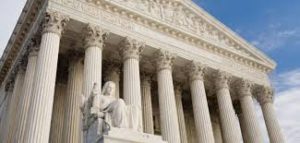 This week, the U.S. Supreme Court dealt a setback to the Fourth Amendment’s right against unreasonable searches and seizures by law enforcement when it decided the case of Utah v. Strieff. Generally, the Fourth Amendment prohibits the introduction of evidence in a criminal trial when that evidence was seized without a search warrant or probable cause unless one of a limited number of exceptions applies. Prior to this case, the Court had not ruled on a case involving the exclusionary rule in five years.
This week, the U.S. Supreme Court dealt a setback to the Fourth Amendment’s right against unreasonable searches and seizures by law enforcement when it decided the case of Utah v. Strieff. Generally, the Fourth Amendment prohibits the introduction of evidence in a criminal trial when that evidence was seized without a search warrant or probable cause unless one of a limited number of exceptions applies. Prior to this case, the Court had not ruled on a case involving the exclusionary rule in five years.
The case began when police received a tip that drugs were being sold out of a Salt Lake City residence. An officer observing the house for suspicious activity saw Strieff leave the house and walk away. The officer stopped the man without any reasonable belief that he had committed any crime and asked him for identification. A records check revealed that Strieff had an outstanding warrant for a traffic offense. The officer placed Strieff under arrest on the warrant and searched him, finding methamphetamine and paraphernalia in his pocket. Strieff was charged with drug offenses.
At trial, Strieff’s defense attorney filed a motion to suppress the drugs and argued that the initial stop was illegal and that any evidence seized after the stop should be suppressed as “fruit of the poisonous tree.” The motion was denied and Strieff entered a conditional plea allowing him to challenge the search on appeal. The Utah Supreme Court agreed with Strieff that the evidence should have been suppressed and reversed the case but the state appealed.
In a 5-3 opinion, the Supreme Court concluded that even though the initial stop was illegal, the evidence was admissible because the discovery of the traffic warrant was an “intervening circumstance” that broke the chain of events between the unlawful stop and the discovery of the evidence. The Court also held that the officer was at most negligent and largely acted in “good faith.”
The majority opinion was sharply criticized by the Court’s liberal-leaning jurists who wrote a dissent warning that the case was going to become an open invitation for law enforcement to purposely conduct more illegal stops since there was no deterrent for doing so. Justice Sotomayor wrote: “The court today holds that the discovery of a warrant for an unpaid parking ticket will forgive a police officer’s violation of your Fourth Amendment rights.”
